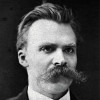“ The noble type of man regards HIMSELF as a determiner of values; he does not require to be approved of; he passes the judgment: "What is injurious to me is injurious in itself;" he knows that it is he himself only who confers honour on things; he is a CREATOR OF VALUES. He honours whatever he recognizes in himself: such morality equals self-glorification. ”
Friedrich Nietzsche, Beyond Good and Evil (1886). copy citation
| Author | Friedrich Nietzsche |
|---|---|
| Source | Beyond Good and Evil |
| Topic | morality value |
| Date | 1886 |
| Language | English |
| Reference | |
| Note | Translated by Helen Zimmern |
| Weblink | http://www.gutenberg.org/files/4363/4363-h/4363-h.htm |
Context
“and were only derivatively and at a later period applied to ACTIONS; it is a gross mistake, therefore, when historians of morals start with questions like, "Why have sympathetic actions been praised?" The noble type of man regards HIMSELF as a determiner of values; he does not require to be approved of; he passes the judgment: "What is injurious to me is injurious in itself;" he knows that it is he himself only who confers honour on things; he is a CREATOR OF VALUES. He honours whatever he recognizes in himself: such morality equals self-glorification. In the foreground there is the feeling of plenitude, of power, which seeks to overflow, the happiness of high tension, the consciousness of a wealth which would fain give and bestow:—the noble man also helps the unfortunate, but not—or scarcely—out of pity, but rather from an impulse generated by the super-abundance of power.”
source


